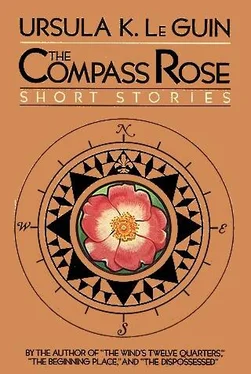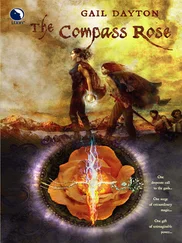Ursula Le Guin - The Compass Rose
Здесь есть возможность читать онлайн «Ursula Le Guin - The Compass Rose» весь текст электронной книги совершенно бесплатно (целиком полную версию без сокращений). В некоторых случаях можно слушать аудио, скачать через торрент в формате fb2 и присутствует краткое содержание. Жанр: Фантастика и фэнтези, на английском языке. Описание произведения, (предисловие) а так же отзывы посетителей доступны на портале библиотеки ЛибКат.
- Название:The Compass Rose
- Автор:
- Жанр:
- Год:неизвестен
- ISBN:нет данных
- Рейтинг книги:3 / 5. Голосов: 1
-
Избранное:Добавить в избранное
- Отзывы:
-
Ваша оценка:
- 60
- 1
- 2
- 3
- 4
- 5
The Compass Rose: краткое содержание, описание и аннотация
Предлагаем к чтению аннотацию, описание, краткое содержание или предисловие (зависит от того, что написал сам автор книги «The Compass Rose»). Если вы не нашли необходимую информацию о книге — напишите в комментариях, мы постараемся отыскать её.
From dream worlds to nightmare planets, through mazes of madness to tiny time holes in space, down Pathways of Desire to a New Atlantis, THE COMPASS ROSE points the way to the wonder-filled mind-country of a remarkable writer.
"As good as any contemporary at creating worlds, imaginary or our own… Le Guin writes with painstaking intelligence. Her characters are complex and haunting, and her writing is remarkable for it's sinewy grace."
—TIME Magazine
The Compass Rose — читать онлайн бесплатно полную книгу (весь текст) целиком
Ниже представлен текст книги, разбитый по страницам. Система сохранения места последней прочитанной страницы, позволяет с удобством читать онлайн бесплатно книгу «The Compass Rose», без необходимости каждый раз заново искать на чём Вы остановились. Поставьте закладку, и сможете в любой момент перейти на страницу, на которой закончили чтение.
Интервал:
Закладка:
When I came out they were all sitting there and none of them was talking. Max had been crying. I could see little candle flames in the tears around his eyes. Simon lay fiat on the bed in the shadows, his eyes closed. Phil Drum sat hunched over, holding the solar cell in his hands.
I loosened the pegs, and put the bow and the viola in the case, and cleared my throat. It was embarrassing. I finally said, “I’m sorry.”
One of the women spoke: Rose Abramski, a private student of Simon’s, a big shy woman who could hardly speak at all unless it was in mathematical symbols. “I saw it,” she said. “I saw it. I saw the white towers, and the water streaming down their sides, and running back down to the sea. And the sunlight shining in the streets, after ten thousand years of darkness.”
“I heard them,” Simon said, very low, from the shadow. “I heard their voices.”
“Oh, Christ! Stop it!” Max cried out, and got up and went blundering out into the unlit hall, without his coat. We heard him running down the stairs.“Phil,” said Simon, lying there, “could we raise up the white towers, with our lever and our fulcrum?”
After a long silence Phil Drum answered, “We have the power to do it.”
“What else do we need?” Simon said. “What else do we need, besides power?”
Nobody answered him.
The blue changed. It became brighter, lighter, and at the same time thicker: impure. The ethereal luminosity of blue-violet turned to turquoise, intense and opaque. Still we could not have said that everything was now turquoise-colored, for there were still no things. There was nothing, except the color of turquoise.
The change continued. The opacity became veined and thinned. The dense, solid color began to appear translucent, transparent. Then it seemed as if we were in the heart of a sacred jade, or the brilliant crystal of a sapphire or an emerald.
As at the inner structure of a crystal, there was no motion. But there was something, now, to see. It was as if we saw the motionless, elegant inward structure of the molecules of a precious stone. Planes and angles "appeared about us, shadowless and clear in that even, glowing, blue-green light.
These were the walls and towers of the city, the streets, the windows, the gates.
We knew them, but we did not recognise them. We did not dare to recognise them. It had been so long. And it was so strange. We had used to dream, when we lived in this city. We had lain down, nights, in the rooms behind the windows, and slept, and dreamed. We had all dreamed of the ocean, of the deep sea. Were we not dreaming now?
Sometimes the thunder and tremor deep below us rolled again, but it was faint now, far away; as far away as our memory of the thunder and the tremor and the fire and the towers falling, long ago. Neither the sound nor the memory frightened us. We knew them.
The sapphire light brightened overhead to green, almost green-gold. We looked up. The tops of the highest towers were hard to see, glowing in the radiance of light. The streets and doorways were darker, more clearly defined.
In one of those long, jewel-dark streets something was moving: something not composed of planes and angles, but of curves and arcs. We all turned to look at it, slowly, wondering as we did so at the slow ease of our own motion, our freedom. Sinuous, with a beautiful flowing, gathering, rolling movement, now rapid and now tentative, the thing drifted across the street from a blank garden wall to the recess of a door. There, in the dark blue shadow, it was hard to see for a while. We watched. A pale blue curve appeared at the top of the doorway. A second followed, and a third. The moving thing clung or hovered there, above the door, like a swaying knot of silvery cords or a boneless hand, one arched finger pointing carelessly to something above the lintel of the door, something like itself, but motionless—a carving. A carving in jade light. A carving in stone.
Delicately and easily the long curving tentacle followed the curves of the carved figure, the eight petal limbs, the round eyes. Did it recognise its image?
The living one swung suddenly, gathered its curves in a loose knot, and darted away down the street, swift and sinuous. Behind it a faint cloud of darker blue hung for a minute and dispersed, revealing again the carved figure above the door: the sea flower, the cuttlefish, quick, great-eyed, graceful, evasive, the cherished sign, carved on a thousand walls, worked into the design of cornices, pavements, handles, lids of jewel boxes, canopies, tapestries, tabletops, gateways. Down another street, at about the level of the first-floor windows, came a flickering drift of hundreds of motes of silver. With a single motion all turned towards the cross street, and glittered off into the dark blue shadows.
There were shadows, now.
We looked up, up from the flight of silver fish, up from the streets where the jade-green currents flowed and the blue shadows fell. We moved and looked up, yearning, to the high towers of our city. They stood, the fallen towers. They glowed in the ever-brightening radiance, not blue or blue-green, up there, but gold. Far above them lay a vast, circular, trembling brightness: the sun’s light on the surface of the sea.
We are here. When we break through the bright circle into life, the water will break and stream white down the white sides of the towers, and run down the steep streets back into the sea. The water will glitter in dark hair, on the eyelids of dark eyes, and dry to a thin white film of salt
We are here.
Whose voice? Who called to us?
He was with me for twelve days. On January 28th the crats came from the Bureau of Health Education and Welfare and said that since he was receiving unemployment compensation while suffering from an untreated illness, the Government must look after him and restore him to health, because health is the inalienable right of the citizens of a democracy. He refused to sign the consent forms, so the chief Health Officer signed them. He refused to get up, so two of the policemen pulled him up off the bed. He started to try to fight them. The chief Health Officer pulled his gun and said that if he continued to struggle he would shoot him for resisting welfare, and arrest me for conspiracy to defraud the Government. The man who was holding my arms behind my back said they could always arrest me for unreported pregnancy with in-tent to form a nuclear family. At that Simon stopped trying to get free. It was really all he was trying to do, not to fight them, just to get his arms free. He looked at me, and they took him out.
He is in the Federal Hospital in Salem. I have not been able to find out whether he is in the regular hospital or the mental wards.
It was on the radio again yesterday, about the rising land masses in the South Atlantic and the Western Pacific. At Max’s the other night I saw a TV special explaining about geophysical stresses, and subsidence, and faults. The U.S. Geodetic Service is doing a lot of advertising around town; the commonest one is a big billboard that says “It’s Not Our Fault!” with a picture of a beaver pointing to a schematic map that shows how even if Oregon has a major earthquake and subsidence as California did last month, it will not affect Portland, or only the western suburbs perhaps. The news also said that they plan to halt the tidal waves in Florida by dropping nuclear bombs where Miami was. Then they will re-attach Florida to the mainland with landfill. They are already advertising real estate for housing developments on the landfill. The President is staying at the Mile High White House in Aspen, Colorado. I don’t think it will do him much good. Houseboats down on the Willamette are selling for $500,000. There are no trains or busses running south from Portland, because all the highways were badly damaged by the tremors and landslides last week, so I will have to see if I can get to Salem on foot. I still have the rucksack I bought for the Mount Hood Wilderness Week. I got some dry lima beans and raisins with my Federal Fair Share Super Value Green Stamp minimal ration book for February—it took the whole book—and Phil Drum made me a tiny camp stove powered with the solar cell. I didn’t want to take the Primus, it’s too bulky, and I did want to be able to carry the viola. Max gave me a half pint of brandy. When the brandy is gone I expect I will stuff this notebook into the bottle and put the cap on tight and leave it on a hillside somewhere between here and Salem. I like to think of it being lifted up little by little by the water, and rocking, and going out to the dark sea.
Читать дальшеИнтервал:
Закладка:
Похожие книги на «The Compass Rose»
Представляем Вашему вниманию похожие книги на «The Compass Rose» списком для выбора. Мы отобрали схожую по названию и смыслу литературу в надежде предоставить читателям больше вариантов отыскать новые, интересные, ещё непрочитанные произведения.
Обсуждение, отзывы о книге «The Compass Rose» и просто собственные мнения читателей. Оставьте ваши комментарии, напишите, что Вы думаете о произведении, его смысле или главных героях. Укажите что конкретно понравилось, а что нет, и почему Вы так считаете.




